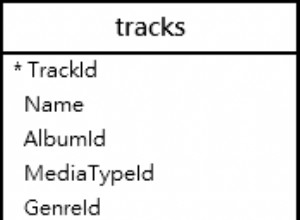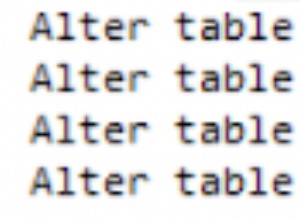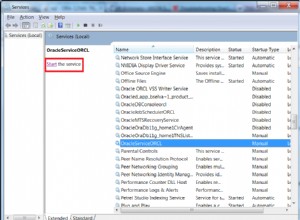Стъпка 1 трябва да бъде изтегляне на SQLcl , можете лесно да запазите изхода на SQL оператори за избор в CSV формат чрез „SET SQLFORMAT CSV“ и SPOOL, той върши работата вместо вас. Така че можете да използвате това, за да преминете през куп имена на таблици / изрази за избор, да запишете изхода на всеки в директория чрез шел скрипт.
След това, ето пакет, който има куп помощни програми за файлове, които всички работят с обектите на Oracle DIRECTORY и файловете в тях. С това и малко PL/SQL можете лесно да изтеглите тези файлове, които сте записали, в таблица. Може да има по-лесни начини да направите това, което се опитвате да направите, и ако има, очаквам с нетърпение да чуя за тях за другите. Това е доста голям проблем за решаване.
1) file_into_blob - За да получите файла в базата данни
2) convert_blob_to_clob - За да конвертирате в clob
3) След това можете да го вмъкнете в таблицата си.
Спецификация на пакета
Create or replace package fileutils as
--
-- This procedure deletes a file, and depends on an Oracle DIRECTORY object being passed
--
Procedure delete_os_file (i_directory varchar2, i_filename varchar2);
--
-- This procedure moves and optionally renames a file,
-- and depends on an Oracle DIRECTORY object being passed
--
Procedure move_os_file ( i_source_directory in varchar2, i_source_file in varchar2, i_target_directory in varchar2, i_target_file in varchar2);
--
-- This procedure takes a blob variable and writes it to a file,
-- and depends on an Oracle DIRECTORY object being passed
--
Procedure blob_into_file (i_directory in varchar2, i_file_name in varchar2, i_blob in blob);
--
-- This procedure takes a file and uploads it into a blob variable
-- and depends on an Oracle DIRECTORY object being passed
--
Procedure file_into_blob(i_directory in varchar2, i_file_name in varchar2, o_blob out blob);
--
-- This procedure converts a clob to a blob
--
Procedure convert_clob_to_blob (i_clob in clob, o_blob out blob);
--
-- This procedure converts a blob to a clob
--
Procedure convert_blob_to_clob (i_blob in blob, o_clob out clob);
--
-- This one checks for file existence without Java
--
Function file_exists (i_directory in varchar2, i_filename in varchar2) return boolean;
--
-- Returns the basename of a filename
-- Works with Windows and UNIX pathnames
--
Function basename (i_filename in varchar2) return varchar2;
--
-- This takes a Base64 string and converts it to a binary BLOB
--
Procedure base64_string_to_blob (i_clob in clob, o_blob out blob);
Function base64_string_to_blob (i_clob in clob) return blob;
--
-- This takes a binary BLOB and converts it to a Base64 string
--
Procedure blob_to_base64_string (i_blob in blob, o_clob out clob);
Function blob_to_base64_string (i_blob in blob) return clob;
End fileutils;
/
Show error;
Тяло на пакета
Set define off;
Create or replace package body fileutils as
Procedure delete_os_file (i_directory varchar2, i_filename varchar2)
is
Begin
utl_file.fremove(i_directory,i_filename);
End;
Procedure move_os_file
(
i_source_directory in varchar2,
i_source_file in varchar2,
i_target_directory in varchar2,
i_target_file in varchar2
)
is
srcdir varchar2(255) := upper(i_source_directory);
tgtdir varchar2(255) := upper(i_target_directory);
begin
--
-- NOTE: If you're getting the all-too-familiar
-- ORA-29292: file rename operation failed
-- and you're SURE that your directory names are correct,
-- and you're SURE that your privileges are correct, both at the
-- OS level, and within the database, there's one last thing that
-- can get you. I learned the hard way that this command will NOT
-- work successfully renaming a file from one filesystem to another,
-- at least when those filesystems are NFS mounted. That is all.
--
utl_file.frename(srcdir,i_source_file,tgtdir,i_target_file,TRUE);
end move_os_file;
Procedure blob_into_file (i_directory in varchar2, i_file_name in varchar2, i_blob in blob)
is
l_file utl_file.file_type;
l_buffer raw(32767);
l_amount binary_integer := 32767;
l_pos integer := 1;
i_blob_len integer;
Begin
i_blob_len := dbms_lob.getlength(i_blob);
l_pos:= 1;
-- Open the destination file.
l_file := utl_file.fopen(i_directory,i_file_name,'wb', 32767);
-- Read chunks of the BLOB and write them to the file
-- until complete.
while l_pos < i_blob_len loop
dbms_lob.read(i_blob, l_amount, l_pos, l_buffer);
utl_file.put_raw(l_file, l_buffer, TRUE);
l_pos := l_pos + l_amount;
end loop;
-- Close the file.
utl_file.fclose(l_file);
End blob_into_file;
Procedure file_into_blob(i_directory in varchar2, i_file_name in varchar2, o_blob out blob)
is
src_loc bfile := bfilename(i_directory, i_file_name);
Begin
-- Initialize the dest blob
o_blob := empty_blob();
-- Open source binary file from OS
dbms_lob.open(src_loc, dbms_lob.lob_readonly);
-- Create temporary LOB object
dbms_lob.createtemporary(
lob_loc => o_blob
, cache => true
, dur => dbms_lob.session
);
-- Open temporary lob
dbms_lob.open(o_blob, dbms_lob.lob_readwrite);
-- Load binary file into temporary LOB
dbms_lob.loadfromfile(
dest_lob => o_blob
, src_lob => src_loc
, amount => dbms_lob.getLength(src_loc));
-- Close lob objects
dbms_lob.close(o_blob);
dbms_lob.close(src_loc);
End file_into_blob;
Function basename (i_filename in varchar2) return varchar2
is
v_basename varchar2(1024);
Begin
--
-- If the regex's below don't match, then it's already at its base name
-- Return what was passed.
--
v_basename := i_filename;
if regexp_like(i_filename,'^.*\\') then
dbms_output.put_line('This is a Windows file');
v_basename := regexp_substr(i_filename,'[^\]*$');
dbms_output.put_line('Basename is : '||v_basename);
end if;
if regexp_like(i_filename,'^/') then
dbms_output.put_line('This is a UNIX file');
v_basename := regexp_substr(i_filename,'[^/]*$');
dbms_output.put_line('Basename is : '||v_basename);
end if;
return v_basename;
End basename;
Function file_exists (i_directory in varchar2, i_filename in varchar2) return boolean
is
v_exists boolean;
v_file_length number;
v_block_size number;
Begin
utl_file.fgetattr(upper(i_directory), i_filename, v_exists, v_file_length, v_block_size);
if (v_exists) then
dbms_output.put_line('File '||i_filename||' exists, '||v_file_length||' bytes');
else
dbms_output.put_line('File '||i_filename||' does not exist');
end if;
return v_exists;
end file_exists;
Procedure convert_clob_to_blob (i_clob in clob, o_blob out blob)
is
v_in pls_Integer := 1;
v_out pls_Integer := 1;
v_lang pls_Integer := 0;
v_warning pls_Integer := 0;
Begin
dbms_lob.createtemporary(o_blob,TRUE);
dbms_lob.converttoblob(o_blob,i_clob,DBMS_lob.getlength(i_clob),v_in,v_out,dbms_lob.default_csid,v_lang,v_warning);
End convert_clob_to_blob;
Procedure convert_blob_to_clob (i_blob in blob, o_clob out clob)
is
v_in pls_Integer := 1;
v_out pls_Integer := 1;
v_lang pls_Integer := 0;
v_warning pls_Integer := 0;
Begin
dbms_lob.createtemporary(o_clob,TRUE);
dbms_lob.converttoclob(o_clob,i_blob,DBMS_lob.getlength(i_blob),v_in,v_out,dbms_lob.default_csid,v_lang,v_warning);
End convert_blob_to_clob;
Procedure blob_to_base64_string (i_blob in blob, o_clob out clob)
is
v_out_cl clob;
file_len pls_integer;
modulo pls_integer;
pieces pls_integer;
amt binary_integer := 23808;
buf raw (32767);
buf_tx varchar2(32767);
pos pls_integer := 1;
filepos pls_integer := 1;
counter pls_integer := 1;
Begin
dbms_lob.createtemporary (v_out_cl, true, dbms_lob.call);
file_len := dbms_lob.getlength (i_blob);
modulo := mod (file_len, amt);
pieces := trunc (file_len / amt);
while (counter <= pieces) loop
dbms_lob.read (i_blob, amt, filepos, buf);
buf_tx:=utl_raw.cast_to_varchar2 (utl_encode.base64_encode (buf));
dbms_lob.writeappend (v_out_cl,length(buf_tx),buf_tx);
filepos := counter * amt + 1;
counter := counter + 1;
end loop;
if (modulo <> 0) THEN
dbms_lob.read (i_blob, modulo, filepos, buf);
buf_tx:=utl_raw.cast_to_varchar2 (utl_encode.base64_encode (buf));
dbms_lob.writeappend (v_out_cl,length(buf_tx),buf_tx);
end if;
o_clob := v_out_cl;
End blob_to_base64_string;
Function blob_to_base64_string (i_blob in blob) return clob
is
v_out_cl clob;
file_len pls_integer;
modulo pls_integer;
pieces pls_integer;
amt binary_integer := 23808;
buf raw (32767);
buf_tx varchar2(32767);
pos pls_integer := 1;
filepos pls_integer := 1;
counter pls_integer := 1;
Begin
dbms_lob.createtemporary (v_out_cl, true, dbms_lob.call);
file_len := dbms_lob.getlength (i_blob);
modulo := mod (file_len, amt);
pieces := trunc (file_len / amt);
while (counter <= pieces) loop
dbms_lob.read (i_blob, amt, filepos, buf);
buf_tx:=utl_raw.cast_to_varchar2 (utl_encode.base64_encode (buf));
dbms_lob.writeappend (v_out_cl,length(buf_tx),buf_tx);
filepos := counter * amt + 1;
counter := counter + 1;
end loop;
if (modulo <> 0) THEN
dbms_lob.read (i_blob, modulo, filepos, buf);
buf_tx:=utl_raw.cast_to_varchar2 (utl_encode.base64_encode (buf));
dbms_lob.writeappend (v_out_cl,length(buf_tx),buf_tx);
end if;
return v_out_cl;
End blob_to_base64_string;
Procedure base64_string_to_blob (i_clob in clob, o_blob out blob)
is
v_out_bl blob;
clob_size number;
pos number;
charBuff varchar2(32767);
dBuffer RAW(32767);
v_readSize_nr number;
v_line_nr number;
begin
dbms_lob.createTemporary (v_out_bl, true, dbms_lob.call);
v_line_nr:=greatest(65, instr(i_clob,chr(10)), instr(i_clob,chr(13)));
v_readSize_nr:= floor(32767/v_line_nr)*v_line_nr;
clob_size := dbms_lob.getLength(i_clob);
pos := 1;
while (pos < clob_size) loop
dbms_lob.read (i_clob, v_readSize_nr, pos, charBuff);
dBuffer := UTL_ENCODE.base64_decode (utl_raw.cast_to_raw(charBuff));
dbms_lob.writeAppend (v_out_bl,utl_raw.length(dBuffer),dBuffer);
pos := pos + v_readSize_nr;
end loop;
o_blob := v_out_bl;
end base64_string_to_blob;
Function base64_string_to_blob (i_clob in clob) return blob
is
v_out_bl blob;
clob_size number;
pos number;
charBuff varchar2(32767);
dBuffer RAW(32767);
v_readSize_nr number;
v_line_nr number;
begin
dbms_lob.createTemporary (v_out_bl, true, dbms_lob.call);
v_line_nr:=greatest(65, instr(i_clob,chr(10)), instr(i_clob,chr(13)));
v_readSize_nr:= floor(32767/v_line_nr)*v_line_nr;
clob_size := dbms_lob.getLength(i_clob);
pos := 1;
while (pos < clob_size) loop
dbms_lob.read (i_clob, v_readSize_nr, pos, charBuff);
dBuffer := UTL_ENCODE.base64_decode (utl_raw.cast_to_raw(charBuff));
dbms_lob.writeAppend (v_out_bl,utl_raw.length(dBuffer),dBuffer);
pos := pos + v_readSize_nr;
end loop;
return v_out_bl;
end base64_string_to_blob;
end fileutils;
/
Show error;




